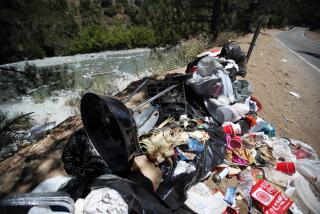COLUMN RIGHT / VIRGINIA POSTREL : Al Gore Has Met the Enemy, and It’s Us : The hawkish candidate pushes an apocalyptic scenario for saving the natural world.
- Share via
Sen. Al Gore, columnist Michael Kinsley observed aptly in 1988, is “an old person’s idea of a young person.” He is also a radical’s idea of a moderate.
Not long ago, Gore seemed like a legitimate moderate or, more accurately, a centrist. While other ambitious Democrats kowtowed to the party’s doves, Gore worked to save the MX missile, supported non-military aid to the Nicaraguan Contras and backed the Gulf War.
But with the Cold War over, foreign-policy issues no longer define left, right and center. We are, finally, living in peacetime.
Gore, however, hasn’t given up his hawkish attitudes. He has merely redirected them toward a new enemy: us. “The struggle to save the global environment is in one way much more difficult than the struggle to vanquish Hitler, for this time the war is with ourselves. We are the enemy, just as we have only ourselves as allies,” he writes in “Earth in the Balance.”
This new war is not for moderates. In his book, the would-be vice president suggests that our civilization is as threatening and “dysfunctional” as Nazi Germany or Stalinist Russia. He likens less-radical environmentalists to Neville Chamberlain.
To vanquish our Hitlerian civilization, Gore suggests, we must subordinate our entire society to a single purpose--environmental preservation, as he defines it. Although Gore the candidate often speaks of other goals, such as improving the lives of working people, Gore the apocalyptic has only one thing on his mind:
“Adopting a central organizing principle--one agreed to voluntarily--means embarking on an all-out effort to use every policy and program, every law and institution, every treaty and alliance, every tactic and strategy, every plan and course of action--to use, in short, every means to halt the destruction of the environment and to preserve and nurture our ecological system. Minor shifts in policy, marginal adjustments in ongoing programs, moderate improvements in laws and regulations, rhetoric offered in lieu of genuine change--these are all forms of appeasement, designed to satisfy the public’s desire to believe that sacrifice, struggle, and a wrenching transformation of society will not be necessary.”
This goes beyond a desire to clean up the air and water. Gore wants not merely to preserve the natural world for human benefit but, he strongly implies, to force us to give up all that is artificial and therefore “inauthentic.”
Gore the apocalyptic sniffs at any material achievement, any alleviation of misery, anything that lessens the “natural” burdens of life. He attacks consumer society for providing such hubristic conveniences as air conditioning, fluorescent lights, medical care and airplanes. He denounces “our insatiable drive to rummage deep beneath the surface of the Earth, remove all the coal, petroleum and other fossil fuels we can find.” Gore the apocalyptic is no moderate looking for cost-effective ways to control air emissions or reduce dependence on foreign oil.
No wonder then-Rep. Gore became in the 1970s the first member of Congress to invite environmental extremist Jeremy Rifkin to testify. Rifkin calls himself a “time rebel” at war with modernity, from biotechnology to computers to beef. He detests consumer society, reminding us that “the term consumer . . . in both its English and French form, has meant ‘to devour,’ ‘to lay waste,’ ‘to destroy’ and ‘to exhaust.’ ” The theoretical sections of Gore’s book are little more than warmed-over Rifkin, although the work nowhere acknowledges the connection.
Liberal journalist Gregg Easterbrook recently took Gore to task in the New Republic for exaggerating environmental threats, distorting the scientific record and suggesting that journalists censor evidence that apocalypse may not be imminent. Gore appears to believe, Easterbrook observed, “that the only correct stance is to press the panic button on every issue”--regardless of the facts.
For a nice, moderate candidate, that seems like odd behavior. For a radical out to remake American society, it’s business as usual.
More to Read
Get the L.A. Times Politics newsletter
Deeply reported insights into legislation, politics and policy from Sacramento, Washington and beyond. In your inbox three times per week.
You may occasionally receive promotional content from the Los Angeles Times.










